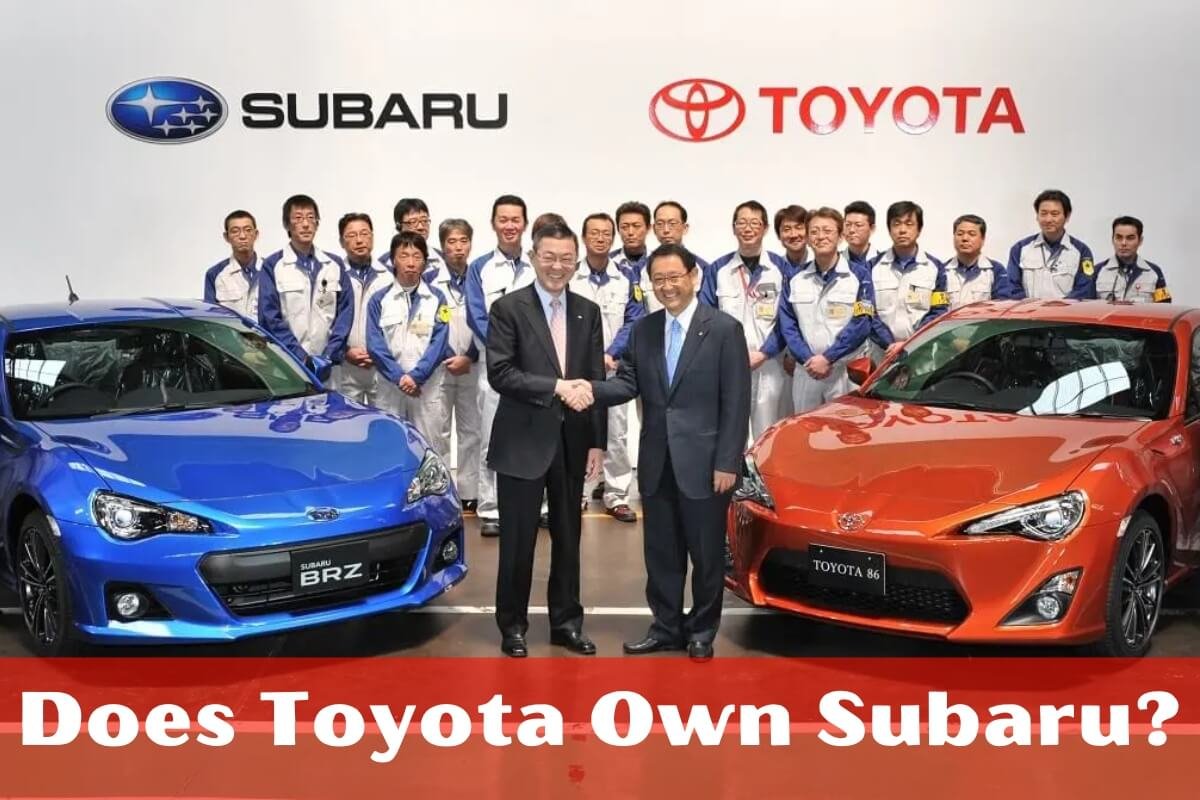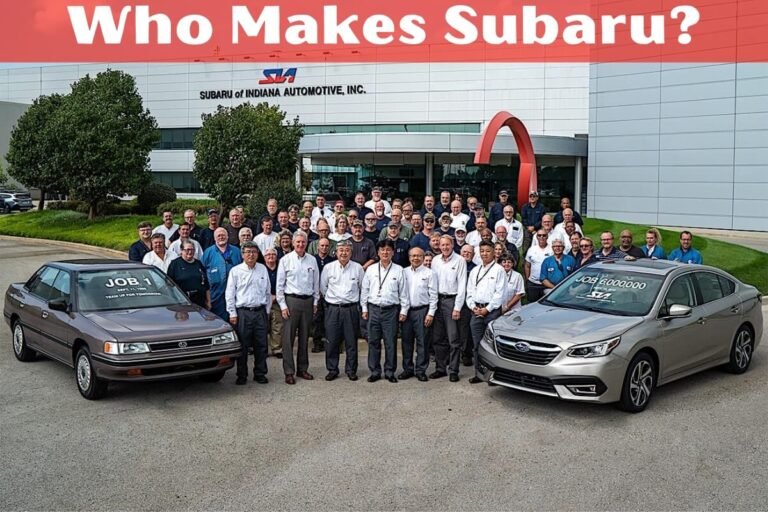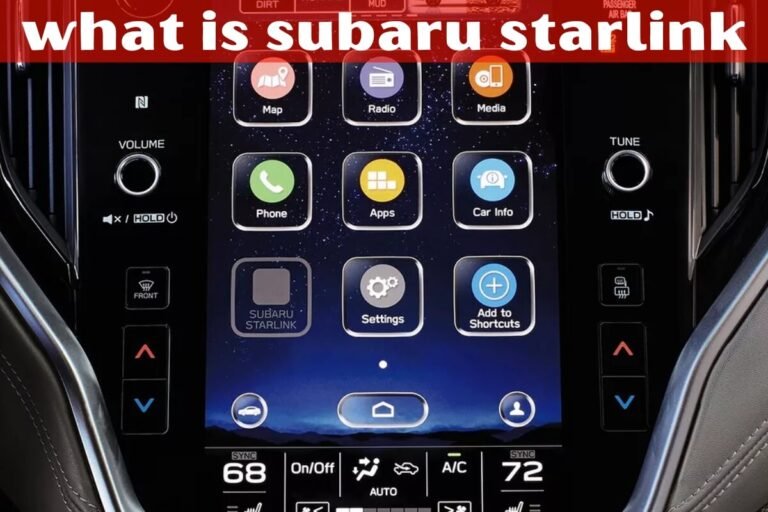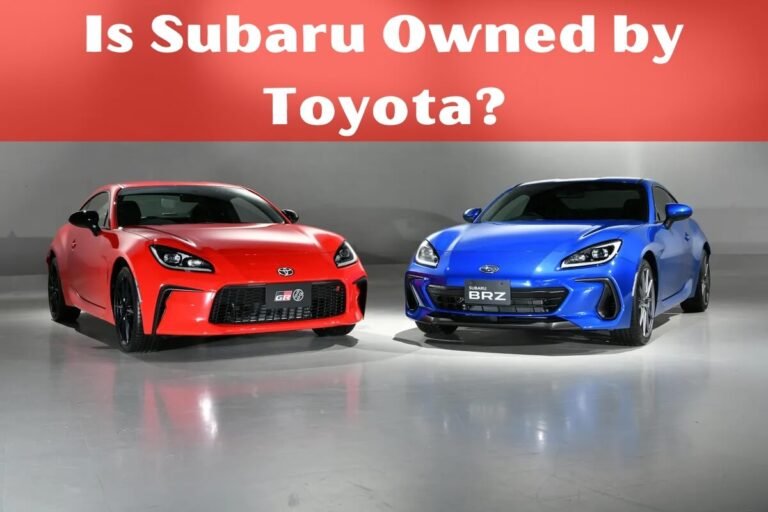Does Toyota Own Subaru? Uncovering the Partnership

When you think of Japanese automakers, Toyota and Subaru are two names that immediately come to mind. Toyota, the world’s largest automaker, is renowned for its reliable and innovative vehicles. Subaru, on the other hand, has carved a niche for itself with its distinct boxer engines and outstanding all-wheel-drive capabilities.
Over the years, there has been a lot of speculation and curiosity surrounding the relationship between these two automotive giants. Many people wonder: Does Toyota own Subaru?
The short answer is no, Toyota does not own Subaru. However, the two companies have a close business alliance, with Toyota holding a significant stake in Subaru.
In this comprehensive blog post, we’ll cover the history and evolution of the Toyota-Subaru partnership, explore their joint projects and collaborations, and understand the implications of Toyota’s stake in Subaru. We’ll also address some frequently asked questions and discuss the potential future of this dynamic alliance.
A Look Back: The Evolution of the Toyota-Subaru Partnership
The roots of the Toyota-Subaru relationship can be traced back to 2005 when Toyota acquired an 8.7% stake in Fuji Heavy Industries (FHI), the parent company of Subaru. This move came after General Motors (GM) sold off its shares in FHI, paving the way for Toyota to step in and establish a partnership.
Over the years, Toyota gradually increased its stake in Subaru. By 2008, Toyota owned more than 16% of Subaru, and in 2019, the company announced plans to raise its stake to over 20%, making it the largest single shareholder in Subaru.
While Toyota’s increasing stake in Subaru has raised eyebrows, it’s important to note that Subaru remains an independent company. Toyota’s stake represents a strategic partnership rather than an outright acquisition or merger.
The significance of this partnership lies in the complementary strengths of the two companies. Toyota, with its vast resources and global reach, has been able to leverage Subaru’s expertise in areas like all-wheel-drive systems and boxer engines. Conversely, Subaru has benefited from Toyota’s advanced technologies, such as hybrid and electric powertrains.
Joint Projects and Collaborations
One of the most visible fruits of the Toyota-Subaru partnership is the Toyota 86 and Subaru BRZ sports cars. Jointly developed by the two companies, these compact rear-wheel-drive coupes combine Toyota’s technology with Subaru’s horizontally opposed boxer engine.
However, the collaboration between Toyota and Subaru extends far beyond this one project. The two companies have shared platforms, technologies, and even manufacturing facilities.
For instance, Subaru has integrated Toyota’s hybrid system into vehicles like the Crosstrek Hybrid, leveraging Toyota’s expertise in electrification. Conversely, Toyota has benefited from Subaru’s renowned all-wheel-drive capabilities, incorporating them into select models like the RAV4.
Moreover, the two companies have co-developed new vehicles, such as the upcoming Subaru Solterra and Toyota bZ4X electric SUVs, which will share a dedicated EV platform.
In addition to product development, Toyota and Subaru have also collaborated on manufacturing. Subaru’s Indiana plant, Subaru of Indiana Automotive (SIA), has built Toyota vehicles like the Camry and the Venza alongside Subaru models.
What Does Toyota’s Stake in Subaru Mean?
Toyota’s increasing stake in Subaru has significant implications for both companies and their customers.
Advantages for Toyota
By holding a significant stake in Subaru, Toyota gains access to Subaru’s renowned all-wheel-drive and boxer engine technologies. This can help Toyota enhance its lineup with more capable and performance-oriented vehicles, particularly in segments like crossovers and sports cars.
Additionally, Toyota can leverage Subaru’s manufacturing capabilities, potentially expanding its production capacity and reducing costs through economies of scale.
Perhaps most importantly, Toyota’s stake in Subaru allows it to accelerate its electrification efforts. By collaborating with Subaru on developing electric and hybrid vehicles, Toyota can broaden its portfolio of eco-friendly offerings and stay ahead of the curve in the rapidly evolving automotive landscape.
Advantages for Subaru
For Subaru, the partnership with Toyota offers several key benefits. Firstly, Subaru gains access to Toyota’s vast resources, expertise, and global reach. This can help Subaru expand its product lineup, enter new markets, and improve its overall competitiveness.
Secondly, Subaru can leverage Toyota’s advanced technologies, such as hybrid systems and electric powertrains. This is crucial as the automotive industry shifts towards electrification, and Subaru needs to keep pace with the changing landscape.
Furthermore, by sharing development costs and risks with Toyota, Subaru can reduce its financial burden and focus its resources more efficiently. This is particularly important for a smaller automaker like Subaru, which may struggle to keep up with larger competitors in terms of research and development investments.
The Future of the Toyota-Subaru Alliance
As the automotive industry continues to evolve rapidly, driven by factors such as electrification, autonomous driving, and connectivity, the Toyota-Subaru alliance is poised to play a significant role.
Both companies have expressed their commitment to further collaboration and joint projects. In fact, Toyota and Subaru have agreed to co-develop a dedicated platform for battery electric vehicles (BEVs), paving the way for future electric models from both brands.
There are also speculations that Toyota may eventually increase its stake in Subaru even further, potentially gaining a controlling interest. However, it’s important to note that such a move would likely be met with regulatory scrutiny and would require careful consideration from both parties.
Regardless of the exact nature of their future relationship, it’s clear that the Toyota-Subaru alliance will continue to be a driving force in the automotive industry, combining Toyota’s resources and global reach with Subaru’s expertise and niche strengths.
Frequently Asked Questions
Is Subaru Owned by Toyota?
No, Subaru is not owned by Toyota. Subaru Corporation, formerly known as Fuji Heavy Industries, is an independent company. However, Toyota holds a significant stake (currently over 20%) in Subaru, making it the largest single shareholder.
Are Toyota and Subaru the Same Company?
No, Toyota and Subaru are not the same company. They are separate and independent automakers with distinct brand identities and product lineups. However, they have a close business alliance and collaborate on various projects, sharing technologies, platforms, and manufacturing facilities.
What Cars Do Toyota and Subaru Make Together?
Some of the notable joint projects between Toyota and Subaru include:
- Toyota 86 and Subaru BRZ sports cars
- Subaru Crosstrek Hybrid (featuring Toyota’s hybrid system)
- Upcoming Subaru Solterra and Toyota bZ4X electric SUVs
- Manufacturing agreements (e.g., Subaru building Toyota Camry and Venza)
The two companies are also co-developing a dedicated platform for future battery electric vehicles.
Will Toyota Eventually Buy Subaru?
While it’s possible that Toyota may increase its stake in Subaru even further, it’s unlikely that Toyota will acquire Subaru outright in the near future. Both companies have stated their commitment to maintaining Subaru’s independence and distinct brand identity.
However, the automotive industry is constantly evolving, and the nature of the Toyota-Subaru relationship may change over time. Industry experts and analysts will continue to monitor the situation and speculate on the potential for a closer integration or even a full acquisition down the line.
Wrap UP
the partnership between Toyota and Subaru is a strategic alliance that has yielded numerous benefits for both companies, including shared technologies, platforms, and manufacturing facilities. While Toyota does not own Subaru outright, its significant stake in the company has paved the way for closer collaboration and joint projects.
As the automotive industry continues to evolve, with a focus on electrification, autonomous driving, and connected technologies, the Toyota-Subaru alliance is well-positioned to leverage their combined strengths and expertise. Whether Toyota increases its stake further or maintains the current arrangement, one thing is certain: the relationship between these two automotive giants will continue to shape the future of the industry.






